Can COVID-19 Cause Erectile Dysfunction? What Studies Say
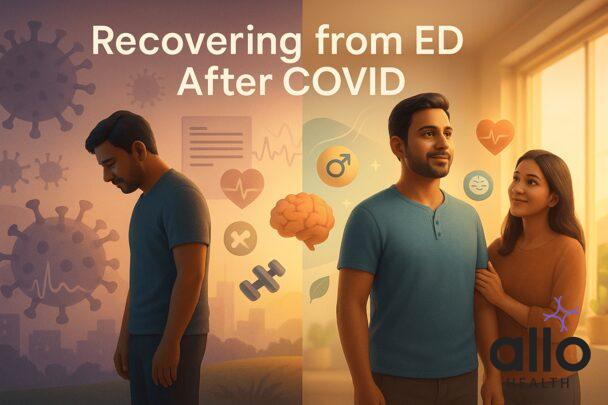
Erectile dysfunction (ED) after COVID-19 is a real and increasingly recognized issue, often caused by vascular damage, low testosterone, long COVID fatigue, and psychological stress. Research shows that many men develop ED either during or after infection, but in most cases, it’s treatable. Effective recovery strategies include lifestyle changes (like improving diet, sleep, and exercise), medications such as PDE5 inhibitors, hormone therapy (if testosterone is low), and mental health support like CBT or couples counseling. Advanced options like shockwave therapy, vacuum devices, and even PRP are available for more severe cases. With early intervention and the right care plan, most men can regain normal sexual function over time.
Wondering how to treat erectile dysfunction after COVID? You’re not alone, and you’re asking the right question. Many men have experienced changes in sexual function during or after a COVID-19 infection, and growing research confirms the link.
COVID-19 affects erections in many ways, from blood vessel damage and low testosterone levels to psychological stress and long COVID fatigue. The good news is, it’s treatable.
In this article, we’ll walk you through why post-COVID erectile dysfunction happens, how long recovery typically takes, and the most effective treatment options, from lifestyle changes and medications to mental health support.
If you’re ready to retake control of your sexual health, this guide is for you.
Can COVID cause Erectile Dysfunction?
One of the widely speculated things post covid 19 has been whether COVID can lead to impotence. Well, studies have found COVID and impotence to be related.
Research[1] has shown that COVID erectile dysfunction has been seen in many men while suffering from COVID and for several months after(so-called long COVID).
A study into long COVID and sexual health shows that even after recovery, some men experience long-term effects, including ED. According to these studies, the effect of the COVID-19 pandemic on the blood vessels, testosterone levels, mental health, and overall health is the reason behind the COVID and impotence link.
Studies show COVID-19 can worsen erectile dysfunction in men who already have it. It can also cause transitory erectile dysfunction in some men.
Let’s dive deeper into how COVID can lead to impotence.
What Causes Post-COVID Erectile Dysfunction?
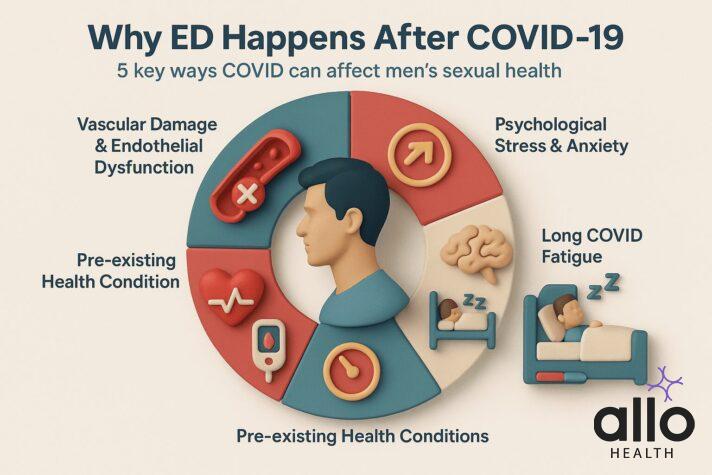
1. Vascular Damage and Endothelial Dysfunction
When it comes to erectile dysfunction after COVID-19, one of the primary[2] mechanisms involves a condition known as endothelial dysfunction, in simple terms, damage to the inner lining of your blood vessels.
SARS-CoV-2, the virus responsible for COVID-19, binds to ACE2 receptors in the body. These receptors are found in many tissues, including the blood vessels within the penile tissue.
Once the virus attaches to these receptors, it can damage the endothelial cells(the inner cell lining of blood vessels) and reduce the production of nitric oxide. This is a vital molecule that helps blood vessels relax and supports proper blood flow during an erection.
This disruption in blood flow can interfere with the body’s natural process of achieving and maintaining erections. And importantly, this vascular damage is not always limited to the period of infection but can become part of long COVID.
2. Testosterone Levels
Studies[3] have found that COVID-19 can impact testosterone levels in men. In fact, around 50% of men who had a COVID-19 infection were shown to have low serum testosterone levels afterward.
Research[4] suggests that the COVID-19 virus may cause testicular damage. The virus binds to ACE2 receptors, which are present in the Leydig cells of the testes.
Leydig cells are the cells responsible for producing testosterone. When these cells are affected, the body may struggle to make enough of this hormone, further lowering testosterone levels and increasing the risk of ED.
Testosterone is the primary male sex hormone, and it’s essential for maintaining sexual function, libido, mood, and overall reproductive health. When testosterone levels drop, it can directly affect a man’s ability to get or maintain an erection.
3. Psychological Factors
COVID-19 can cause a lot of stress and harm to mental health. Research[5] shows that anxiety is a major risk factor for developing COVID erectile dysfunction.
This problem is hard because it creates a cycle. Erectile difficulties cause anxiety. Anxiety then makes the ED worse.
Concerns about transmitting the virus to your partner, changes in intimacy patterns, or general fatigue from being sick can significantly affect sexual health.
The good news is that addressing these mental health aspects – whether through stress management, counseling, or simply acknowledging that these concerns can be an important part of treating COVID erectile dysfunction.
3. Long Covid Fatigue
Long COVID or post-COVID is a range of different health issues that can persist or develop after initial infection. Long COVID symptoms are brain fog, fatigue, cardiovascular problems, anxiety, depression, and other health issues. These long-term effects of COVID-19 in men can significantly harm sexual health and can cause ED.
In general, long COVID leads to a state of long period of inflammation(hyperinflammation stage) in the body, which can harm the organs in the body, including the penis.
4. Other Health Conditions
Other health complications present in some people can make them more prone to complications of COVID-19. These health conditions, like heart disease(cardiovascular diseases), diabetes, have a higher risk of developing ED post-COVID.
Many of these health issues themselves have ED as one of their complications or symptoms.
COVID can affect your blood vessels and hormones, both of which are essential for healthy erections. It’s not in your head , there’s a real biological link we can work with.
How to Treat Erectile Dysfunction After COVID
There are several proven ways to treat post-COVID ED, whether it’s from physical changes, low testosterone, or mental health impacts.
Lifestyle and Home Remedies
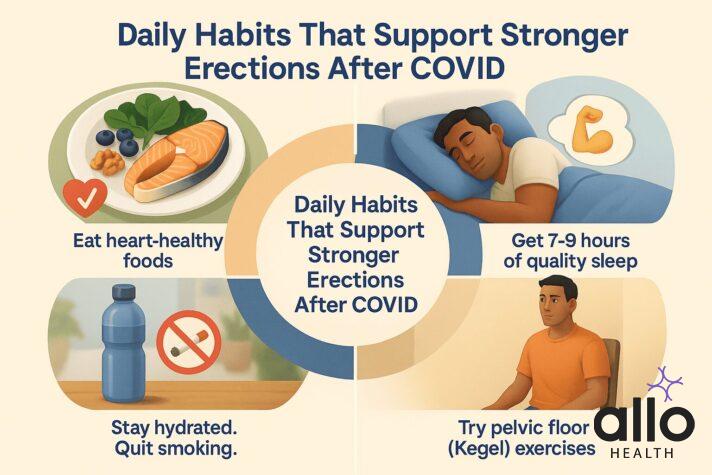
- Eat heart-healthy foods like leafy greens, berries, nuts, and fatty fish, what’s good for your heart, are also great for your erections.
- Get 7–9 hours of sleep each night to support hormone regulation and recovery.
- Stay hydrated and avoid excessive alcohol.
- Quit smoking as it damages blood vessels, which can worsen ED.
- Try pelvic floor exercises (Kegel exercises). They strengthen the muscles that support erections and can be done discreetly anytime.
Medications and Supplements
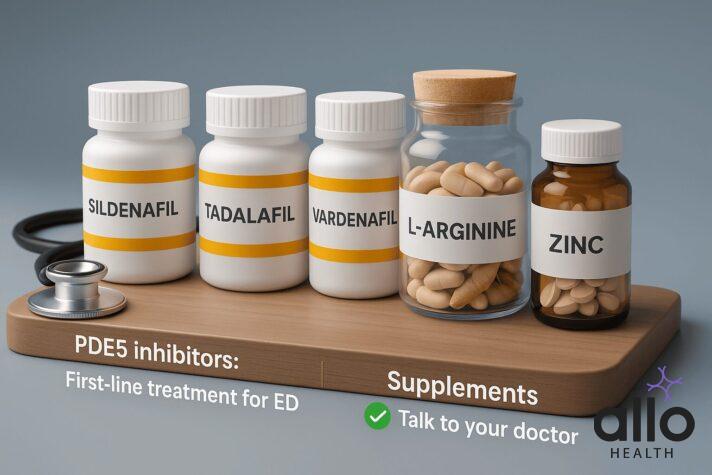
- For many men, PDE5 inhibitors like Viagra (sildenafil), Cialis (tadalafil), or Levitra (vardenafil) are very effective, especially when ED is linked to vascular damage from COVID.
- If tests show low testosterone, hormone replacement therapy may help, but only after proper medical evaluation.
- Some men find support in natural supplements like L-arginine, ginseng, or zinc, but these should only be taken under a doctor’s guidance to avoid interactions or side effects.
Mental Health and Emotional Support
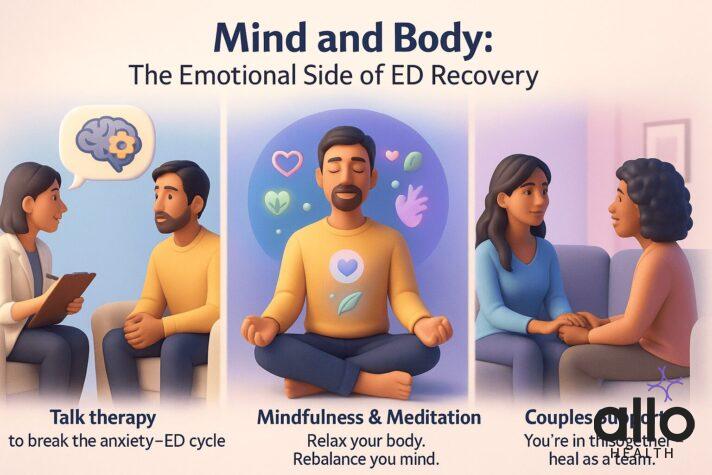
- Cognitive Behavioral Therapy (CBT) has proven effective for ED with psychological causes.
- Mindfulness and meditation can lower stress and improve performance.
- Couples therapy can help if the relationship has been affected.
When to See a Doctor
If your symptoms last longer than a few weeks or affect your confidence or relationship, it’s time to get help.
- Start with a primary care doctor, who’ll check for underlying conditions and may refer you to a specialist.
- Urologists focus on sexual function and physical causes of ED.
- Endocrinologists can help if hormones like testosterone are involved.
- Mental health professionals are essential when stress, anxiety, or trauma are contributing factors.
Treatment Recommendations by Severity
|
Severity |
Recommended Approach |
|---|---|
|
Mild–Moderate ED |
Lifestyle changes, PDE5 inhibitors, and mental health support |
|
Moderate–Severe ED |
Combo therapy (meds + vacuum), check testosterone, consider shockwave therapy |
|
Treatment-Resistant ED |
Penile implant surgery(prosthetic implant), clinical trials (PRP/stem cells), full psychological evaluation |
How Long Does It Take to Recover from Post-COVID Erectile Dysfunction?
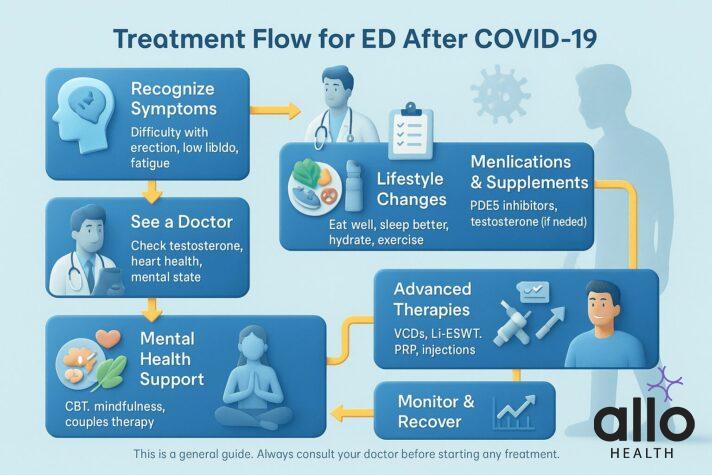
Recovery timelines vary. Some men see improvement in a few weeks, while others may take 3-6 months or more, especially if vascular or hormonal issues are involved.
The encouraging news? Most men recover fully with the right combination of lifestyle changes, medication, and psychological support. Think of it like getting back in shape after an illness; it takes consistency and patience.
Stick with your treatment plan, and don’t get discouraged if results aren’t immediate. Progress is gradual, and steady care usually leads to noticeable improvement over time.
Can COVID-19 Vaccination cause ED
COVID-19 vaccines[6] do not cause erectile dysfunction or harm to male sexual health. In fact, they help protect against COVID-19 itself, a known risk factor for ED. The science is clear: vaccination is safe, effective, and supports men’s sexual and reproductive health.
|
Aspect |
Effect of the COVID-19 Vaccine |
Evidence Level |
|---|---|---|
|
Erectile function |
No negative effect; may improve |
High (multiple studies) |
|
Sexual satisfaction |
No negative effect; may improve |
High |
|
Fertility |
No negative effect |
High |
|
Anxiety about sexual health |
Decreases after vaccination |
Moderate |
Allo Health Insights: What We’ve Seen in Recovery from Post-COVID ED
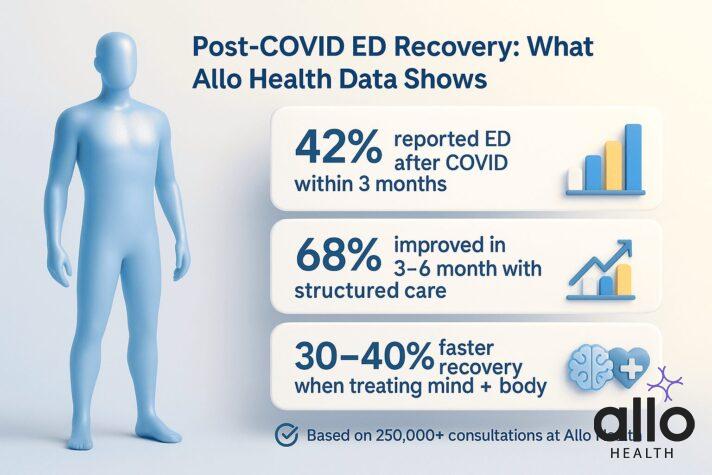
At Allo Health, we’ve consulted with over 250,000+ patients across India, and our data shows that erectile dysfunction after COVID-19 is more common than many expect, but also very treatable.
- Around 42% of men recovering from COVID-19 reported new or worsened erectile difficulties within 3 months of infection.
- Among these, 68% showed noticeable improvement within 3-6 months when following a structured care plan (including lifestyle changes and medication).
- Men who addressed both physical and mental health factors recovered 30-40% faster than those who focused on just one aspect.
- Common issues observed post-COVID: fatigue, low testosterone, performance anxiety, and vascular damage, all of which respond well to tailored treatment.
These insights highlight a hopeful truth: most men can fully recover their sexual function with consistent support, and you’re never alone in that journey.
Key Takeaway
COVID-19 can impact your sexual health, but it doesn’t have to define it. From vascular damage and hormonal shifts to stress and fatigue, the causes of post-COVID erectile dysfunction are real, but so are the solutions.
Whether it’s through lifestyle changes, medications, or mental health support, recovery is possible, and many men get back to full function with the right care.
So if you’ve been struggling with ED after COVID-19, don’t suffer in silence or wait for it to pass on its own. Reach out to a qualified healthcare provider, get the support you deserve, and take that first step toward feeling better physically, emotionally, and sexually.
"The following blog article provides general information and insights on various topics. However, it is important to note that the information presented is not intended as professional advice in any specific field or area. The content of this blog is for general educational and informational purposes only.
Book consultation
The content should not be interpreted as endorsement, recommendation, or guarantee of any product, service, or information mentioned. Readers are solely responsible for the decisions and actions they take based on the information provided in this blog. It is essential to exercise individual judgment, critical thinking, and personal responsibility when applying or implementing any information or suggestions discussed in the blog."






